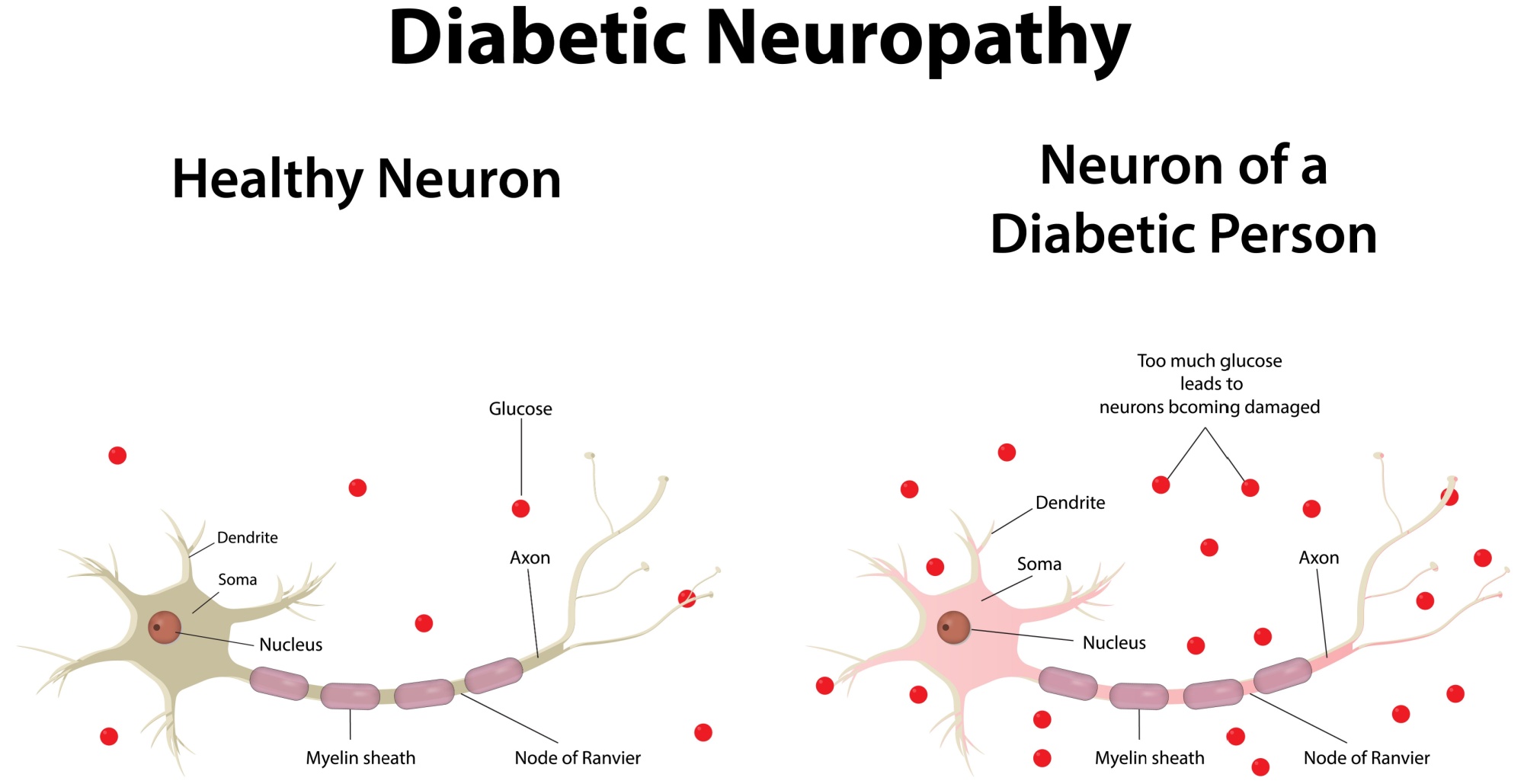What's On This Page?
ToggleDealing with diabetes and diabetic nerve pain is more than just managing blood sugar levels – it’s also about coping with the painful other complications that result from that. The single most common and debilitating issue is nerve pain for most people, also known as diabetic neuropathy. Believe it or not, up to 50% of people with diabetes will experience some form of nerve damage, often leading to pain, tingling, or even numbness in the hands and feet. And to make matters worse, inflammation often tags along, making those symptoms even more unbearable.
So, how can you tackle this dual challenge of nerve pain and inflammation? Is there a way to manage it naturally without relying solely on medications? Let’s dive into some strategies to help you find relief and regain control over your life.
What Causes Diabetic Neuropathy and Inflammation?
Before we get to the solutions, let’s quickly break down why diabetic nerve pain and inflammation happen in the first place. High blood sugar levels can damage the walls of the small blood vessels that supply your nerves, especially in your legs. This damage can mess with nerve function, causing pain, tingling, or numbness. Inflammation also plays a huge role here. When your body’s immune response kicks in, it can further damage nerves, creating a vicious cycle where high blood sugar leads to inflammation, which then causes more nerve damage.

1. Lifestyle Changes: Your First Line of Defense
The first step to managing diabetic nerve pain and inflammation is, unsurprisingly, managing your diabetes. Keeping your blood sugar levels in check can prevent further nerve damage and help reduce inflammation.
- Eat a Balanced Diet: Focus on whole foods, minimize refined sugars, and aim for high-fiber options. The Mediterranean diet, rich in fruits, veggies, whole grains, and healthy fats, has been shown to improve blood sugar control and reduce inflammation.
- Exercise Regularly: Physical activity like walking, swimming, or cycling can help regulate blood sugar and reduce inflammation. Plus, it boosts circulation, which is crucial for nerve health.
- Maintain a Healthy Weight: Reducing excess weight lessens pressure on your nerves, especially in your feet and legs, and makes it easier to manage blood sugar.
- Quit Smoking: Smoking damages blood vessels and can worsen neuropathy. By quitting, you’ll improve your circulation and reduce inflammation, giving your nerves a better chance to heal.
2. Natural Supplements for Nerve Pain Relief
Several supplements can help manage nerve pain and inflammation naturally. While these aren’t instant fixes, they can support your overall treatment plan and help manage symptoms over time.
- Alpha-Lipoic Acid (ALA): This antioxidant helps reduce pain and improve nerve function. Taking 600 mg of ALA daily can significantly relieve symptoms of diabetic neuropathy.
- Acetyl-L-Carnitine: This amino acid supports nerve function and pain relief. Taking a daily dose of 500 mg to 1,000 mg can help improve neuropathy symptoms and promote nerve regeneration. It is also known for its positive effects on cognition, as it is converted into acetyl-L-carnitine, a molecule that plays a crucial role in memory and brain health.

Curcumin from turmeric spice - Curcumin: The active ingredient in turmeric, curcumin, is famous for its anti-inflammatory properties. Taking 500 mg to 1,000 mg daily, especially with piperine for better absorption, can help reduce inflammation and nerve pain.
- Omega-3 Fatty Acids: Found in fish oil, flaxseeds, and chia seeds, omega-3s are known for their anti-inflammatory effects. They can help reduce pain and inflammation associated with diabetic neuropathy.
- Gymnema Sylvestre: This herb is traditionally used to support blood sugar management, which can indirectly help reduce nerve pain.
- Cinnamon: Known for its anti-inflammatory and blood sugar-regulating properties, cinnamon can be a helpful addition to your routine.
- Fig Fruit Extract: Fig fruit has been shown to have potential anti-inflammatory effects, which can be beneficial for managing neuropathy symptoms.
- Banaba Leaf: This plant extract helps regulate blood sugar levels, which can be crucial in preventing further nerve damage.
3. Topical Treatments for Quick Relief
When the pain is intense, topical treatments can offer faster relief without the side effects that often come with oral medications.
- Capsaicin Cream: Made from chili peppers, capsaicin helps relieve pain by reducing Substance-P, a chemical that transmits pain signals. Applying capsaicin cream to the painful areas can help ease discomfort.
- CBD Oil: Cannabidiol, or CBD, is gaining popularity for its pain-relieving properties. Topical CBD might help reduce pain and inflammation linked with diabetic neuropathy. Look for high-quality, full-spectrum CBD products for the best results.
- Essential Oils: Oils like lavender, peppermint, and eucalyptus have anti-inflammatory and pain-relieving properties. Mix a few drops with a carrier oil like coconut oil and apply it to the affected areas for relief.
4. When to Consider Medications
While natural remedies can be incredibly helpful, sometimes medications are necessary to effectively manage pain. Always consult with your healthcare provider before starting any new medication.
- Gabapentin (Neurontin): This medication alters how the brain perceives pain and is commonly prescribed for diabetic nerve pain.
- Pregabalin (Lyrica): Similar to gabapentin, this is FDA-approved for diabetic neuropathy and can be highly effective for diabetic nerve pain.
- Duloxetine (Cymbalta): An antidepressant that also helps manage nerve pain by affecting pain processing in the brain and spinal cord.
- Amitriptyline (Elavil): Though primarily an antidepressant, amitriptyline can help relieve diabetic nerve pain by changing the brain’s pain signals.
5. Exploring Advanced Therapies
New treatments for diabetic nerve pain (neuropathy) are emerging as medical science evolves. These options may be suitable if traditional treatments aren’t providing relief.
- Electromagnetic Therapy: This involves using electromagnetic fields to improve blood flow and nerve function, potentially reducing pain.
- Platelet-Rich Plasma (PRP) Injections: PRP therapy uses concentrated platelets from your own blood to promote healing and reduce inflammation. Early research is promising. Learn more here at the site for John Hopkins.
- Stem Cell Therapy: Stem cells may help repair damaged nerves and reduce inflammation. This therapy is still experimental but shows potential for regenerating nerve tissue and relieving diabetic nerve pain.

A Holistic Approach to Managing Diabetic Nerve Pain and Inflammation
Managing diabetic nerve pain and inflammation requires a holistic approach. Here’s a quick recap:
- Control Your Blood Sugar: Use a mix of diet, exercise, and medication to keep blood sugar levels in check. This is one of the most effective ways to relieve diabetic nerve pain.
- Try Supplements and Natural Remedies: Consider options like alpha-lipoic acid, acetyl-L-carnitine, curcumin, omega-3s, gymnema, cinnamon, FIG FRUIT extract, and banaba leaf.
- Use Topical Treatments: Capsaicin cream, CBD oil, and essential oils can provide immediate relief.
- Consider Medications: If natural remedies aren’t enough, consult your healthcare provider about prescription options.
Summary
Living with diabetic nerve pain and inflammation is challenging, but you have options to manage the pain and improve your quality of life. It’s all about finding the right combination of lifestyle changes, natural remedies, and medications that work best for you. Remember to consult with your healthcare provider before starting any new treatment to ensure it’s safe and suitable for your condition. Relief might take time, but with persistence and the right approach, you can take back control.

Suzy Cohen, has been a licensed pharmacist for over 30 years and believes the best approach to chronic illness is a combination of natural medicine and conventional. She founded her own dietary supplement company specializing in custom-formulas, some of which have patents. With a special focus on functional medicine, thyroid health and drug nutrient depletion, Suzy is the author of several related books including Thyroid Healthy, Drug Muggers, Diabetes Without Drugs, and a nationally syndicated column.


